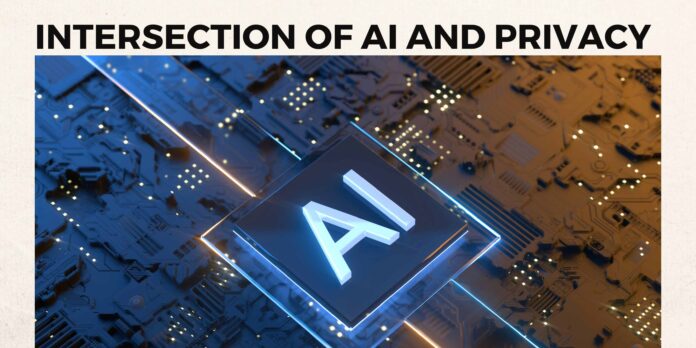In today’s increasingly connected world, the rapid advancement of artificial intelligence (AI) is transforming the way we live and work. AI technologies such as generative AI and machine learning have the potential to revolutionize various industries and improve our daily lives.
However, as AI becomes more prevalent, the need to safeguard personal information and protect privacy has become paramount.
AI is experiencing exponential growth, with its applications expanding across industries. From intelligent virtual assistants and autonomous vehicles to personalized recommendations and predictive analytics, AI is becoming an integral part of our digital ecosystem.
The amount of data being generated and processed by AI systems is vast, raising concerns about how personal information is collected, used, and protected.
In the digital era, privacy is a fundamental human right that must be upheld. Privacy ensures individuals have control over their personal data and protects them from potential harms such as identity theft and discrimination.
With the increasing collection and analysis of personal data by AI systems, the need to address privacy concerns has become more crucial than ever before.
READ ALSO: Ultimate Digital Privacy Guide
Table of Contents
Privacy Challenges in the Age of AI
As AI technology continues to advance, it presents unique challenges to personal privacy. Understanding these challenges is crucial in developing strategies to safeguard personal information and ensure ethical AI practices.

Violation of Privacy
One of the primary concerns surrounding AI is the potential violation of privacy. AI systems heavily rely on vast amounts of data for training and decision-making.
However, the lack of controls over how data is captured and used raises concerns about unauthorized access to personal information.
Safeguarding personal data from falling into the wrong hands is essential to prevent identity theft, cyberbullying, and other malicious activities.
Bias and Discrimination
AI systems can inadvertently perpetuate bias and discrimination if trained on biased datasets. This can result in unfair or discriminatory outcomes based on factors such as race, gender, or socioeconomic status.
Ensuring that AI systems are trained on diverse and representative datasets and regularly audited for bias is crucial in promoting fairness and protecting individuals’ privacy rights.
Job Displacements for Workers
The increasing adoption of AI technologies has raised concerns about job displacement and economic disruptions.
As AI systems automate tasks previously performed by humans, certain industries may experience significant changes, potentially leading to job losses.
This can have implications for individuals’ privacy as they may be forced to compromise their privacy in order to find alternative employment or navigate the gig economy.
READ ALSO: How Companies Can Streamline Operations Through Smart AI Solutions
Data Abuse Practices
AI technologies can be misused by bad actors for various purposes, including the creation of convincing fake images and videos for spreading misinformation or manipulating public opinion.

Data abuse practices pose significant privacy risks, as individuals’ images and personal information can be exploited without their consent.
Protecting against data abuse requires robust cybersecurity measures and public awareness of potential risks.
The Power of Big Tech on Data
Big Tech companies have emerged as powerful entities with significant influence over the global economy and society. Their access to vast amounts of data raises concerns about data privacy and the responsible use of personal information.
The Influence of Big Tech Companies
Companies like Google, Amazon, and Meta have become synonymous with the digital age. They collect and process immense volumes of data, enabling them to shape consumer behavior and influence public opinion.
With the rise of AI and the forthcoming shift to the metaverse, the power and influence of Big Tech companies are expected to grow further.
Responsibility and Ethical Data Practices
The power wielded by Big Tech companies comes with great responsibility. Transparency, accountability, and ethical data practices are essential in ensuring the protection of personal information.
Big Tech companies must be proactive in disclosing their data practices and informing users of how their data is collected, used, and shared. Furthermore, they should adopt privacy-centric approaches and prioritize user privacy in the design and development of AI systems.
READ ALSO: Beyond Breaches: Turning Cybersecurity Transparency Into a Business Advantage
Data Collection and Use by AI Technologies
AI technologies rely on vast amounts of data to train models and make accurate predictions. The collection and use of personal data raise concerns about privacy and data protection.
The Role of AI in Data Collection

AI systems collect data from various sources, including online activities, social media posts, and public records. While this data may seem innocuous, it can reveal sensitive personal information and potentially compromise individuals’ privacy.
Understanding the scope and implications of data collection is crucial in addressing privacy concerns associated with AI.
Privacy Concerns and Data Protection
Protecting personal data in the age of AI requires robust data protection measures. Encryption, anonymization, and secure data storage are essential in safeguarding personal information.
Additionally, data governance frameworks and regulations play a pivotal role in ensuring responsible data collection, use, and sharing practices.
Individuals’ Privacy-Conscious Choices and Practices
Individuals have a crucial role to play in safeguarding their own privacy. By adopting privacy-conscious choices and practices, individuals can take control over their personal information and mitigate potential privacy risks.
Awareness and Education about AI and Privacy Risks
One of the most important things that individuals can do to protect their privacy is to be aware of the risks posed by AI. AI is a powerful tool that can be used to collect and analyze personal information in ways that were never before possible.
This raises new privacy risks, as AI can be used to track our behavior, predict our future actions, and even manipulate our thoughts and emotions.
It is important to be aware of the risks posed by AI and privacy so that you can make informed decisions about how you use the internet and how you share your personal information.
There are a number of resources available to help you learn more about the risks posed by AI and privacy.
Managing Privacy Settings and Permissions
Most websites and apps allow users to control their privacy settings. This means that users can choose what information they share with the website or app, and who they share it with.

It is important to take the time to review the privacy settings for each website and app that you use. This will help you to ensure that you are only sharing the information that you are comfortable sharing.
Some of the things that you can do to manage your privacy settings include:
- Review the privacy policy of each website and app that you use: The privacy policy will explain what information the website or app collects, how it uses the information, and with whom it shares the information.
- Choose your privacy settings carefully: Most websites and apps will give you a number of different privacy settings to choose from. Choose the settings that are most appropriate for you.
- Be careful about what information you share. Only share the information that you are comfortable sharing.
- Be aware of the risks of social media: Social media platforms are notorious for collecting and sharing personal information. Be careful about what you share on social media, and be aware of the privacy settings for each platform.
- Use privacy-focused browsers: There are a number of privacy-focused browsers available, such as DuckDuckGo and Brave. These browsers block trackers and other forms of tracking, which can help to protect your privacy.
- Use strong passwords and change them regularly: Strong passwords can help to protect your accounts from unauthorized access. Make sure to use different passwords for each account, and change your passwords regularly.

- Be careful about what information you share online: Only share the information that you are comfortable sharing. Be especially careful about sharing personal information, such as your Social Security number, your credit card number, and your home address.
- Be aware of data brokers: Data brokers are companies that collect and sell personal information about consumers. You can opt out of data brokers by using an automated service like Incogni to remove your personal information from data brokers.
Cleaning Up Your Digital Footprint
Regularly reviewing and cleaning up one’s digital footprint is an effective way to protect personal information. This includes deleting unnecessary accounts, limiting the sharing of personal information on social media, and being mindful of the information shared online.
Taking proactive steps to minimize the digital footprint helps reduce the exposure of personal data to potential privacy breaches.
Opting Out from Data Brokers
Data brokers collect and sell personal information, often without individuals’ knowledge or consent. Opting out from data brokers is an important privacy-conscious choice that individuals can make. By understanding how to opt out and actively taking steps to remove personal information from data broker databases, individuals can regain control over their personal data and limit its use by third parties.

Incogni is an automated service that can help you remove your personal information from data brokers. Incogni uses a proprietary algorithm to search for your personal information on over 500 data broker websites and public records databases. Once they find your information, they will send removal requests to the websites and data brokers on your behalf.
Incogni is a cost-effective way to remove your personal information from data brokers. Subscribers can keep their data off the market with a 1-year subscription at a 50% discount ($6.49/mo), and they guarantee that they will remove your information from all of the data brokers that they search.
If you are concerned about your privacy, and you want to remove your personal information from data brokers, then I recommend using Incogni. It is a safe and effective way to protect your privacy.
Government Regulations and Policy Considerations
Government regulations and policies play a vital role in protecting individuals’ privacy and ensuring ethical AI practices. Comprehensive privacy legislation is necessary to address the challenges posed by AI and safeguard personal information.

The Need for Comprehensive Privacy Legislation
Comprehensive privacy legislation is crucial in establishing clear guidelines and standards for the collection, use, and protection of personal data.
Such legislation should address the unique challenges posed by AI, including data privacy, algorithmic bias, and transparency requirements.
Governments must work collaboratively to develop legislation that strikes a balance between promoting innovation and protecting individuals’ privacy rights.
Balancing Innovation and Privacy Protection
Finding the right balance between innovation and privacy protection is a key consideration in AI governance. Policymakers must create an enabling environment that fosters innovation while ensuring that privacy rights are respected and protected.
Collaboration between governments, industry stakeholders, and civil society organizations is essential in addressing the complex challenges at the intersection of AI and privacy.
Transparency and Explainability in AI Systems
Transparency and explainability are critical aspects of ethical AI systems. AI models and algorithms should be transparent and accountable to ensure that individuals understand how their personal data is used and the reasoning behind AI-driven decisions.

The Importance of Transparency
Transparency in AI systems involves providing clear information about data collection, processing, and decision-making.
Individuals should have access to understandable explanations of how AI systems operate and use their personal information.
Transparent AI systems enable individuals to make informed decisions about sharing their data and ensure accountability in the use of AI technologies.
Ensuring Explainable AI
Explainable AI refers to the ability of AI systems to provide understandable explanations for their decisions and actions.
Building trust in AI technologies requires transparency in the decision-making process and the ability to understand how and why AI systems arrive at specific outcomes.
Explainable AI empowers individuals to challenge biased or discriminatory decisions and promotes fairness and accountability.
Privacy by Design: Embedding Privacy in AI Systems
Privacy by design is a proactive approach to embedding privacy principles and protections into the design and development of AI systems.
By considering privacy from the outset, AI developers can mitigate privacy risks and ensure that privacy is a fundamental aspect of AI technologies.

Privacy Impact Assessments
Privacy impact assessments (PIAs) are systematic processes for identifying and addressing potential privacy risks associated with AI systems.
Conducting PIAs helps identify privacy vulnerabilities, assess the impact on individuals’ privacy rights, and implement appropriate measures to mitigate risks.
Integrating PIAs into the development lifecycle of AI systems promotes privacy by design and strengthens privacy protections.
Privacy-Preserving Techniques
Privacy-preserving techniques, such as differential privacy and federated learning, can help safeguard personal information while enabling AI systems to learn from diverse datasets.
These techniques allow for the analysis of data without directly exposing sensitive information, reducing the risk of privacy breaches.
By incorporating privacy-preserving techniques, AI systems can strike a balance between data utility and privacy protection.

Collaboration between Stakeholders
Addressing the complex challenges at the intersection of AI and privacy requires collaboration between stakeholders, including industry players, academia, policymakers, and civil society organizations.
Industry Collaboration and Best Practices
Industry collaboration is vital in establishing best practices for responsible AI development and deployment. Sharing knowledge, experiences, and lessons learned helps drive ethical AI practices and promotes transparency and accountability.
Industry organizations and consortia can play a crucial role in developing guidelines and frameworks for privacy-centric AI systems.
Partnerships between Academia and Industry
Partnerships between academia and industry facilitate research, knowledge exchange, and the development of innovative solutions. Collaborative efforts can contribute to the design of AI algorithms that are fair, unbiased, and respectful of privacy.
By combining academic expertise with industry insights, stakeholders can work together to address the ethical implications of AI and develop privacy-enhancing technologies.
The Role of Individuals in Protecting Their Privacy
In the digital age, our personal information is constantly being collected and used by businesses, governments, and other organizations. This can be a privacy risk, as our personal information can be used to track us, target us with ads, or even commit identity theft.
There are a number of things that individuals can do to protect their privacy. These include:
- Being aware of the risks posed by AI and privacy: Artificial intelligence (AI) is increasingly being used to collect and analyze personal information. This raises new privacy risks, as AI can be used to track our behavior, predict our future actions, and even manipulate our thoughts and emotions.

- Managing privacy settings and permissions: Most websites and apps allow users to control their privacy settings. This means that users can choose what information they share with the website or app, and who they share it with.
- Making privacy-conscious choices and practices: Individuals can also make privacy-conscious choices about how they use the internet and what information they share online. For example, individuals can choose to use privacy-focused browsers, such as DuckDuckGo, and they can choose to opt out of data brokers.
Conclusion
As AI technologies continue to advance, the need to safeguard personal information and protect privacy becomes increasingly critical. Privacy concerns in the age of AI encompass issues such as data collection, transparency, bias, and the responsible use of personal data.
Addressing these challenges requires a multi-faceted approach involving government regulations, industry best practices, individual privacy-conscious choices, and collaboration between stakeholders.
By prioritizing privacy, embedding privacy principles into AI systems, and promoting transparency and accountability, we can ensure that AI technologies are developed and deployed in an ethical and responsible manner.
As individuals, organizations, and governments work together, we can strike a balance between innovation and privacy protection, creating a future where AI benefits society while respecting privacy rights.
INTERESTING POSTS
- Surfshark Black Friday Deals 2023 – Bigger Discounts and More Security
- eyeZy Review: Is It the Best Spy App for You?
- What You Need to Know About Infrastructure As Code
- Why Learning To Code Is Good For Your Child
- What You Need to Know About NIST Cybersecurity Framework
- Why Is Cybersecurity In Financial Services Important?
- The Role of Artificial Intelligence in Cybersecurity
- The Intersection of Cybersecurity and AI
About the Author:
John Raymond is a cybersecurity content writer, with over 5 years of experience in the technology industry. He is passionate about staying up-to-date with the latest trends and developments in the field of cybersecurity, and is an avid researcher and writer. He has written numerous articles on topics of cybersecurity, privacy, and digital security, and is committed to providing valuable and helpful information to the public.







